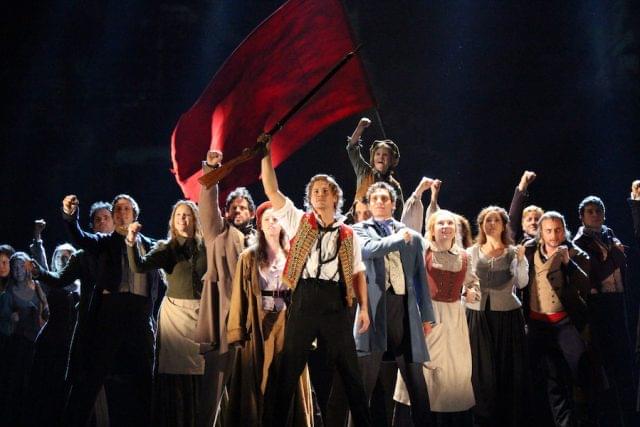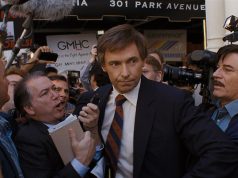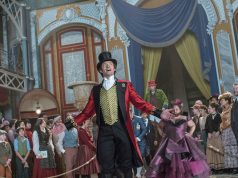
“Les Misérables” has been popular around the world ever since Victor Hugo wrote it, and even more so since someone had the good sense to turn it into a synthesizer-based stage musical. The other big Broadway hit of the ’80s, “The Phantom of the Opera,” was also based on a French novel, as were most of the Broadway hits of previous decades, including “Le King and Moi,” “Le Sound de Musique,” and “Oklahomme!”
The musical version of “Les Misérables” has earned billions of dollars and has been seen by millions of audience members in hundreds of thousands of countries, proving the old show business adage that people love watching French people die. It has permeated every level of society. Since 1987, not a day has gone by in which someone in a high school drama class has not sung a line from “I Dreamed a Dream.” Yet despite all this, the show has not been made into a movie until now. Sure, there have been numerous movie versions of the “Les Misérables” novel, but not of the musical based on the novel. Now, at last, starting on Christmas Day, audiences will be able to enjoy the epic story the way Victor Hugo intended: entirely in song, starring Wolverine.
Let us take a few minutes to reflect on the long, uninteresting history of this classic story.
The history of “Les Misérables”
“Les Misérables” began 30 years before it was written, when some angry French students dragged the chairs out of the kitchen to make a fort in the street and then got killed by soldiers. This came to be known in history as One of Several French Revolutions — Not “The” French Revolution You Hear A Lot About, But A Smaller One. Inspired by this, novelist Victor Hugo (whose name in French means “Big Winner”) incorporated the events of that fateful day into a book he was writing about France’s impoverished lower class, who were known as “the miserable.” That book: “Gulliver’s Travels.”
No, I kid, it was “Les Misérables.” “Gulliver’s Travels” is something I just made up. Hugo published “Les Misérables” in 1862, at a time when not many novels were being written in French due to the difficulty of producing the accents and the curly things under the C’s on a typewriter. You had to use a combination of command/alt keys, which most typewriters did not even have. Among the handful of French novels written during that era, only a few have survived, including “Les Misérables,” “Le Comte de Monte-Cristo,” “Les Aventures de Huckleberrie Fin,” and “Le Grande Gatsby.”
Hugo’s novel was a smash success, despite being 1,500 pages long and in French. More than 300 pages of the book are devoted to a detailed description of the elaborate sewers that run underneath the streets of Paris and smell exactly like the streets of Paris. (A marvel of civil engineering, the Parisian sewer system became even more vital to the city’s wellbeing when bathing became fashionable, in the 1970s.)
Filmmakers started making movie versions of “Les Misérables” as soon as movies were invented, and not a moment sooner. But nearly all of these cinematic interpretations were sorely lacking in choreographed musical numbers in which dockside whores sing about selling their teeth. It took some French geniuses of live theater to rectify this: lyricist Alain Boublil and composer Claude-Michel Schönberg, who in 1980 staged a musical version of “Les Misérables” that captured all the grandeur of Hugo’s novel without all that pesky “reading.” The show was a flop until it was expanded and translated into English and re-launched in London in 1985. That version was a hit, and a reminder of the sobering fact that everything makes more money in English, including French things.
The 1985 London production of “Les Misérables” is still running now, 27 years later, though most of the original cast has died or gone insane. The Broadway production ran from 1987 to 2003, and only closed when it did because New York City needed a location for a new Olive Garden. There have also been other versions in other languages, but I don’t feel like looking them up. Spanish, probably. Maybe Japanese.
Two years ago, the show’s producer, Cameron Mackintosh, said, “Why the eff isn’t this a movie already? They made a movie out of ‘Mamma Mia,’ for crying out loud.” Whoever was standing near him when he said this got to work, and next thing you know, the guy who directed “The King’s Speech” was making “Les Mis” with Hugh Jackman, Russell Crowe, Anne Hathaway, and sure, why not, Borat. Soon fans who have worn out their CDs of the original cast recording will be able to see this film and be upset that it does not sound exactly like their CDs of the original cast recording.
Here are some other interesting facts about the musical “Les Misérables”!
– Gavroche the street urchin didn’t die in the original production. That element was added after an audience member shot the kid during a performance.
– Grocery stores near theaters where “Les Misérables” is being performed often notice a surge in copycat loaf-of-bread shoplifting crimes.
– The war parts are boring.
– When the show was translated into English, certain elements that were very specific to French culture had to be changed in order to appeal to a mass audience. For example, in the original French, the song “Drink with Me” was called “Drink Champagne with Me, for Breakfast”; “At the End of the Day” was “At the End of the Day At Least We Still Have Socialized Medicine”; “A Heart Full of Love” was “A Mouth Full of Cheese”; “One Day More” was “One Bidet More”; and “Do You Hear the People Sing?” was “Don’t Shoot! We Surrender!”
– It used to be funny to intentionally mispronounce it “Less Miserables,” but only until like ninth grade.
– The composer once admitted in a candid interview that he only put “Bring Him Home” in such a high key as a prank to see if anyone would actually try to sing it that way.
– A sequel to the show, called “Les Even More Misérables,” which focused on Javert’s now-destitute wife and children, was a huge flop on Broadway, though nearly everyone who did see it agreed it was better than “Cats.”




